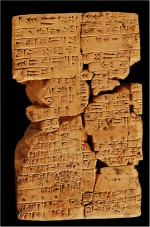Harvard Expert Discusses Archive of Earliest Tablet
Dr. Benjamin Studevent-Hickman, a professor in the Department of Near Eastern Languages and Civilizations at Harvard University, will present a lecture titled, “Ancient Themes: A New Archive from Ancient Iraq and Its Remarkable Journey through the Antiquities Market and U.S. Customs,” at 3 p.m. Thursday, April 7.
The lecture, in Ledbetter Hall Room B in the Donaghey Student Center, is free and open to the public. It is sponsored by UALR’s Middle Eastern Studies program.

The event will mark the first public lecture focused on a set of ancient cuneiform tablets that was illicitly excavated in Iraq, smuggled into the United States, damaged during the Sept. 11, 2001, terrorist attacks, and finally repaired and returned to Baghdad late last year.
Cuneiform script is one of the earliest known forms of written expression that emerged in Sumer, considered the birthplace of civilization.
Aside from providing important new information on the early history of Sumer, the texts highlight the ethical issues surrounding unprovenanced or unknown sourced artifacts, as well as the deep-seated connections between the ancient and modern Middle East.
Studevent-Hickman is an ancient historian specializing in the study of ancient Mesopotamia, with a particular interest in the social and economic history of Babylonia in the third millennium B.C. He received his Ph.D. from Harvard in March 2006 and worked as a research associate at the Oriental Institute of the University of Chicago before returning to Harvard as a lecturer on Assyriology at Harvard.
His publications include “The Ninety-Degree Rotation of the Cuneiform Script,” “Prisma,” the forthcoming publications, “The Workforce at Ur III,” “Umma,” “Nature of the Half-time Arrangement,” and a monograph titled “Lagash and the Religious Economy of Early Babylonia.”